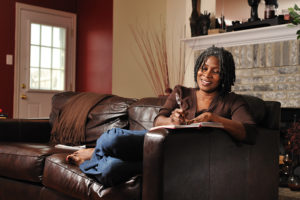April 13, 2020

Overcome Alzheimer’s caregiving challenges through regular journaling.
Alzheimer’s caregiving is a fluid, ever-evolving undertaking. One day may be calm and peaceful, with the individual taking pleasure in activities, eating healthy meals, and sharing laughter with you; while the following day might be filled with agitation, anxiety and sullenness. What will today bring?
Figuring out how to best manage the difficult behaviors and also to ensure life is as satisfying and comfortable as possible for an individual with dementia can be made easier through a simple tool: journaling. Here is an easy method to implement it in your everyday caregiving routine, and how to utilize your journal to increase quality of life for a senior loved one:
- Track symptoms and caregiving needs every single day. Your notes do not need to be lengthy, but record any issues that occur, including time of day and what may have initiated the challenges. Also include activities the person was able to manage independently, as well as those that were challenging. At the conclusion of every week, review the behaviors to see if a pattern can be noticed – such as heightened agitation before meals or bedtime.
- Track eating habits. Take note of which foods are most popular with your senior loved one, which are easiest for him or her to self-feed, how many meals/snacks tend to be eaten and also at what times during the day, etc. Remember to record beverages, to ensure the individual is taking in adequate quantities of fluid to remain hydrated. In going over your notes, you may find that six smaller sized meals through the course of the day are better for your loved one than three larger ones, for example.
- Track safety considerations. Maintaining safety is a high concern in dementia care, with a number of dangers that could result from wandering, dizziness/balance problems, hallucinations, and misunderstanding what common items are used for, such as thinking a household cleaner could actually be a sports drink. Securing dangerous items or putting them in out-of-reach locations is crucial, and keeping a summary of changes made to the home environment for safety’s sake can be very helpful to notify other loved ones to potential risks.
It is also a great idea to take your journal with you to your loved one’s medical appointments, and bring any concerns recorded to his / her attention. This enables you to be completely prepared in advance of appointments with questions you want to get answered, capitalizing on the limited time available to consult with physicians.
Our highly trained and knowledgeable dementia care experts can provide many more tips for specialized in-home care that improves safety while maximizing independence, purpose, and meaning. Contact Continuum today at (314) 863-9912 and let our top-rated assisted home care in St. Louis help make every day the best it can be for someone you love with dementia.
